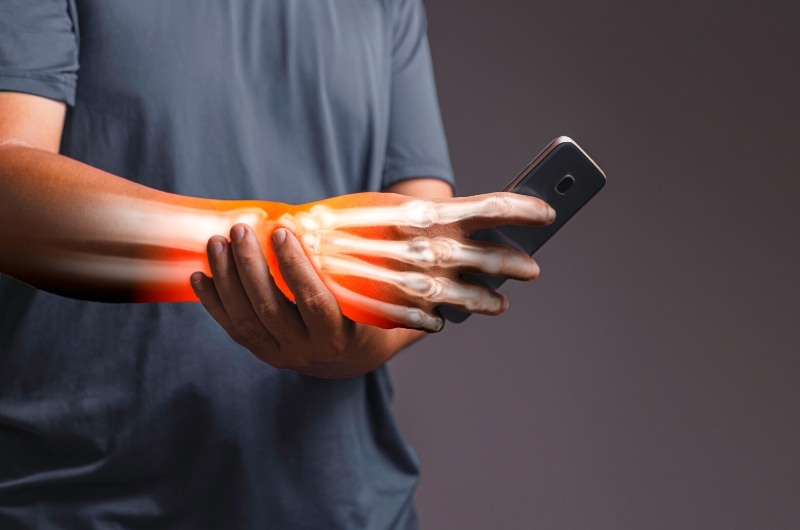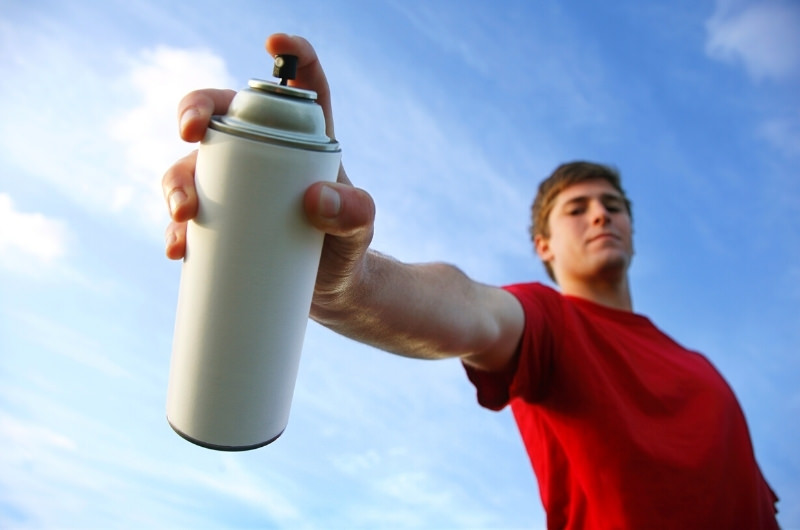A numbing feeling after spray painting could be caused by temporary nerve damage or a long-term condition like carpal tunnel syndrome. To avoid adverse effects from permanent nerve damage caused by CTS, you should visit your doctor and get a diagnosis as soon as you start feeling finger numbness after spray painting.
Spray painting causes finger numbness to most people opting to perform some DIY spray painting tasks.
When we press on the spray can nozzles during the painting episodes, we may end up with a numb finger. This may cause some to panic as the numbness persists.
So, what could be the cause of this numbness, and how long can it persist?
99% of people who indulge in spray painting complain of finger numbness. However, what makes this situation concerning remains the fact that the condition may persist for weeks, even months.
This numbness gets most people worrying if it could be permanent or disappear after taking quite a long time to disappear. This article looks into the numbing issue and tries to come up with a solution for your discomfort.
So what causes finger numbness after spray painting?
It could be temporary nerve damage
Doctors term the numbing feeling on your finger as temporary numbness or temporary paralysis.
According to Dr. Raymond and other doctors on healthtap.com, this feeling results from applying pressure to your finger’s nerve or nerves for a prolonged period.
The resulting condition becomes Digital Neuropraxia, where the blood fails to reach the digital nerve due to pressure applied to the finger. Depending on how long you held the spray paint nozzle, you may have this numbness for a varying period of time.
The nerves help us detect hotness, coldness, or even pain in our bodies. When using the spray paint can, you tend to use your finger to press the nozzle. The pressing applies pressure on these nerves, and the pressure may cause temporary paralysis on the nerves.
Depending on the amount of time you spend spraying, the paralysis may last for days, weeks, or months.
You might cause temporary damage to the nerves by pressing on the spray can for a prolonged period. Until the nerves get repaired, you might feel numbness on your finger.
Will massaging and hot and cold therapy help cure the numbness?
When your finger feels numb after spray painting, it can really bother you. The finger may cause distress to your whole body.
To avoid this struggle, consider using the following measures to reduce the distress:
- Gently massage the finger’s affected area, spreading on the other regions and finally the whole arm. Massaging helps in restoring blood flow to the injured nerves. Although the nerves may take some time to heal fully, regular massaging helps to fasten the healing.
- Use some hot therapy techniques on the affected area. It’s believed that hot and cold packs help in nerve healing therapy. The hot or cold feeling stimulates the nerves to restore their sensation in a hot or cold environment.
- When spray painting, you may consider investing in a spray can-gun. You will apply pressure on a wide area of the can-gun, thereby using your arm rather than your finger. This way, you will reduce the chances of developing digital Neuropraxia.
As time goes by, with continued massaging and applying the heat and cold therapy, the nerve gets to heal, and your finger will start regaining its sensitivity to touch, heat, cold, and pain once more.
Could you be developing carpal tunnel syndrome?

Sometimes, when the median nerve on the wrist gets compressed, you may develop numbing on some of your fingers.
If you work with spray paint often, this act may trigger this condition, and your finger-numbing may indicate the development of carpal tunnel syndrome.
What causes carpal tunnel syndrome?
This condition comes about when a swelling causes compression on the median nerve in the wrist area. When a nerve swells, causing inflammation on the tendons of the wrist area, the median nerve may get compressed.
When this happens, the peripheral nerves may get traumatized. If this occurs after a spray painting episode, your thumb or index finger may feel numb.
Unlike the numbness from temporary nerve damage, this numbness may stay for a longer time.
Other symptoms associated with carpal tunnel syndrome (CTS) include:
- A tingling sensation on your fingers.
- Burning or itching sensation on the palm or the fingers of the affected hand.
- Pain on your wrist, palm, or fingers.
- Permanent numbness on the fingers.
- Permanent muscle weakness along the muscles associated with the median nerve.
As much as the condition may affect average aged people, it majorly gets diagnosed in older adults aging from 65 years and above.
Women tend to suffer from the disease more than men.
The National Institute of Neurological Disorders and Stroke (NINDS) confirms that this condition affects 3-6% of adults in the United States.
How to discover you suffer from CTS
Unlike in temporary nerve damage from spray painting, you will notice a cycle process with the CTS. People who suffer from CTS started by getting the need to shake off their hands.
This feeling may cause you to wake up at night only to leave you with an unstoppable discomfort.
The discomfort gets accompanied by pain, numbness, or a tingling sensation on the palm, the thump, and the two fingers neighboring the thump.
This feeling slowly affects the whole hand and your forearm in the long run. The symptoms seem to persist during the day.
As a result, doing some daily tasks like the following may start becoming problematic:
- Lose grip and strength to hold objects.
- It may become difficult to form a fist with the affected hand.
- Doing your buttons become a challenge.
- You may become unable to open a bottle of soda.
- You may not feel hot or cold substances with your thumb or finger.
- It may become hard to type on your computer’s keyboard.
- A numb feeling on your fingers or thump after performing a task like a spray painting task.
If you experience the above symptoms, you should consider visiting your doctor to avoid permanent nerve damage. If you get a diagnosis for CTS, then it may save your hand to start treatment.
Will you choose medication or surgery?
For treatment of CTS, you may choose to do surgery or take medication. Some self-help tips may also help with reducing the severity of the condition.
For less severe CTS, medication may help slow its progression as the medicines help in reducing pressure on the median nerve.
Some of the self-help tips that help with CTS include:
- It would be best if you considered resting your hand and wrist. You should avoid performing tasks with the affected hand and let it rest. Resting will help reduce pressure on the median nerve and prevent pain, discomfort, numbness, or tingling sensation.
- Perform cold compressions on the wrist regularly. Cold compressions will help to ease the pain. Don’t, however, use ice directly on the skin.
- You may find help with a therapist. A therapist will teach you how to perform repetitive tasks differently and avoid discomfort.
- You may learn how to control the discomfort triggers. If you realize that the pain becomes intense after working your arm, resting at intervals may help rest your arm.
- Consider using wrist splints. The wrist splints will help you maintain the wrist in one position while asleep or during the day.
You may choose to perform surgery if the symptoms don’t improve and the condition becomes severe. Surgery helps in removing the carpal ligament, which serves as the roof of the carpal tunnel.
This helps in removing pressure from the median nerve and helps with the CTS symptoms. As per Cleveland Clinic, this option has a success rate of over 90%. You will not worry about numbness ever again.
The table below helps in summarizing the symptoms of digital Neuropraxia versus those of carpal tunnel syndrome.
| Digital Neuropraxia symptoms | CTS symptoms |
|---|---|
| Numbness on one finger used to apply pressure during spray printing | Numbness on your thump, index finger, and ring finger |
| Numbness may persist for some days, weeks, or months but finally goes away | The numbness may stay for a long time and never seems to go away, but rather worsen |
| The palm, wrist, and fingers may become painful. | |
| A tingling sensation accompanies the numbness across the fingers and palm. | |
| It may become difficult to hold on to objects. | |
| The wrist muscles may weaken as the condition progresses. |
Frequently Asked Questions (FAQs)
Can spray paint damage the nerves?
As much as spray paint may not cause direct damage to nerves, it may interfere with your sensory nerves when it sticks on your finger. This is because the sensory nerves may not detect heat or cold quickly enough due to the spray paint’s protective layer on your skin.
Why does my hand go numb when I paint?
The pressure you exert on your hand while painting may cause trauma to your nerves. This pressure causes temporary paralysis to your nerves which makes your hand numb.
Should I wear a mask when spray painting?
Yes, a mask should help prevent inhaling the addictive and toxic fumes from the spray paint. Some people have suffered huffing paint from continued exposure to chemicals found in paint.
What are the side effects of inhaling spray paint?
Spray paint may cause addiction to users if inhaled regularly, causing a huffing effect. When the toxic components found in the paint get to the lungs, they may cause lung damage and sometimes cause death.
Final thoughts
Since most people suffer from finger numbness after spray painting, it would help if we invested in spray can-guns which help reduce the spraying pressure. You need to attach this can-gun to your spray can nozzle and enjoy spray painting without causing any pressure on your finger.
Continued digital Neuropraxia may cause CTS. So, avoid causing pressure on your fingers as well as on your medial nerve.


